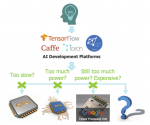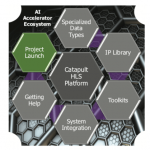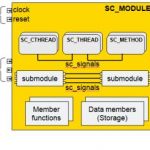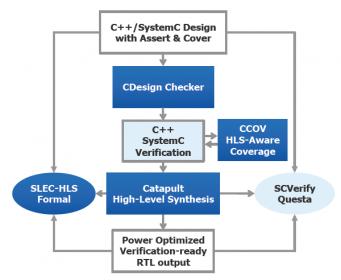Custom AI acceleration continues to gather steam. In the cloud, Alibaba has launched its own custom accelerator, following Amazon and Google. Facebook is in the game too and Microsoft has a significant stake in Graphcore. Intel/Mobileye have a strong lock on edge AI in cars and wireless infrastructure builders are adding AI capabilities… Read More
Tag: hls
DVCon Is a Must Attend Event for Design and Verification Engineers
Learning is a never-ending process for design and verification engineers, so outside of reading SemiWiki you likely want to attend at least a few events per year to keep updated, learn something new, attend a workshop, or even present something that has made your IC project work much better than before. Sure, DAC is always a great… Read More
Formal and High-Level Synthesis
Formal verification has made significant inroads in RTL and gate-level verification because it provides complementary strengths to conventional dynamic verification methods; using both provides higher levels of coverage and confidence in the correctness of an implementation. I haven’t heard as much about formal use in … Read More
AI Hardware Summit, Report #2: Lowering Power at the Edge with HLS
I previously wrote a blog about a session from Day 1 of the AI Hardware Summit at the Computer History Museum in Mountain View, CA, held just last week. From Day 2, I want to delve into this presentation by Bryan Bowyer, Director of Engineering, Digital Design & Implementation Solutions Division at Mentor, a Siemens Business.… Read More
Konica Minolta Talks About High-Level Synthesis using C++
In the early days of chip design circa 1970’s the engineers would write logic equations, then manually reduce that logic using Karnaugh Maps. Next, we had the first generation of logic synthesis in the early 1980’s, which read in a gate-level netlist, performed logic reduction, then output a smaller gate-level netlist.… Read More
An AI Accelerator Ecosystem For High-Level Synthesis
AI accelerators as engines for object or speech recognition (among many possibilities), are becoming increasingly popular for inference in mobile and power-constrained applications. Today much of this inferencing runs largely in software on CPUs or GPUs thanks to the sheer size of the smartphone market, but that will shift… Read More
The Implications of the Rise of AI/ML in the Cloud
Recently, Daniel Nenni blogged on the presentation Wally Rhines gave at #56th DAC. Daniel provided a great summary, but I want to dive into a portion of the presentation in more detail. I love Wally’s presentations, but sometimes you cannot absorb the wealth of information he provides when you initially see it. It’s… Read More
Update on SystemC for High-Level Synthesis
The scope of current system designs continues to present challenges to verification and implementation engineering teams. The algorithmic complexity of image/voice processing applications needs a high-level language description for efficient representation. The development and testing of embedded firmware routines… Read More
Mentor Showcases Digital Twin Demo
Mentor put on a very interesting tutorial at DVCon this year. Commonly DVCon tutorials center around a single tool; less commonly (in my recent experience) they will detail a solution flow but still within the confines of chip or chip + software design. It is rare indeed to see presentations on a full system design including realistic… Read More
Catapult Design Checker Finds Coding Errors Before High Level Synthesis
In a recent whitepaper Gagandeep Singh, Director of Engineering at Mentor, a Siemens Business outlines a flow using Catapult Design Checker that helps in early detection of coding errors as many companies are turning to High-Level Synthesis (HLS) methodology. This requires that high -level C++ models are correct, that ambiguities… Read More











